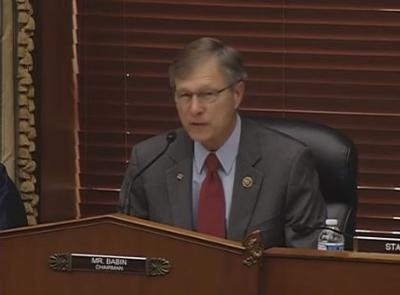Administrator Bolden Testifies Before The Panel
Members of the Space subcommittee of the House Science Committee recently questioned NASA Administrator Charles Bolden at a Space Subcommittee hearing titled “An Overview of the Budget Proposal for the National Aeronautics and Space Administration for Fiscal Year 2017.”

“Unfortunately, this administration has once again done a disservice to NASA, its employees, and our nation by providing a budget request that ignores the budget agreement, requesting mandatory funding for NASA," said Space Subcommittee Chairman Brian Babin (R-TX) (pictured). "I had hoped that the administration would demonstrate leadership by proposing a realistic budget, but instead we were presented with a list of unfunded priorities.
“Other nations, such as China, are working adamantly to become the global leader in space exploration. The consequences of America getting it right or wrong are not immediate, but they are enormous. The rules are going to be made by those countries that are on the surface of the Moon and Mars, not those that stayed home,” he said.
“There are some areas of agreement between the Committee and the administration in NASA’s Fiscal Year 2017 budget request. But this proposed budget continues to tie our astronauts’ feet to the ground and makes a Mars mission all but impossible," said full committee chairman Lamar Smith (R-TX).
“It is NASA’s responsibility to provide a compelling plan for space exploration and execute it. It is Congress’s responsibility to ensure NASA’s budget is prioritized and funded. This Committee will do everything in its power to support American leadership in space,” Smith said in his prepared remarks.
Members criticized the administration’s proposal for its reliance on mandatory spending that would require significant tax increases in addition to dramatic cuts to Social Security, Medicare, and Medicaid, student loan programs and veterans benefits.
The proposal also suggests cuts to key exploration programs similar to previous years’ budgets. NASA’s FY17 proposal would strip $987 million from the Space Launch System and Orion crew capsule, which are being developed for deep space destinations such as Mars. The budget also recommends cuts to Planetary Science of $240 million, while continuing to disproportionately grow Earth Science budgets at a rate of 70 percent since 2008.

In his prepared remarks, NASA Administrator Bolden (pictured) said that the budget continues preparations for an eventual Mars expedition. "The first step in our Journey to Mars is our current activity in low Earth orbit (LEO), where research and technology development activities conducted aboard ISS are delivering the knowledge we need to keep our astronauts safe," Bolden said.
He added that the FY 2017 budget includes $826.7 million for Space Technology "to conduct rapid development and incorporation of transformative space technologies to enable NASA's future missions."
The budget also includes funding for a ten-year plan "that would significantly accelerate aeronautics research. We seek support from congress for a substantial increase in funding for aeronautics that will dramatically improve the aircraft of the future." Bolden said that NASA is ready to test technologies and concepts by developing "X-plane" demonstrators.
He said that NASA would continue to develop the Asteroid Redirect Mission to remove a multi-ton boulder from a target asteroid and use solar-electric power to move that boulder into a lunar orbit which would then be studied by a manned mission using the SLS launch system and Orion vehicle.
 ANN's Daily Aero-Term (05.19.24): Back-Taxi
ANN's Daily Aero-Term (05.19.24): Back-Taxi Aero-News: Quote of the Day (05.19.24)
Aero-News: Quote of the Day (05.19.24) Aero-News: Quote of the Day (05.20.24)
Aero-News: Quote of the Day (05.20.24) ANN's Daily Aero-Term (05.20.24): Blind Speed
ANN's Daily Aero-Term (05.20.24): Blind Speed ANN's Daily Aero-Linx (05.20.24)
ANN's Daily Aero-Linx (05.20.24)




